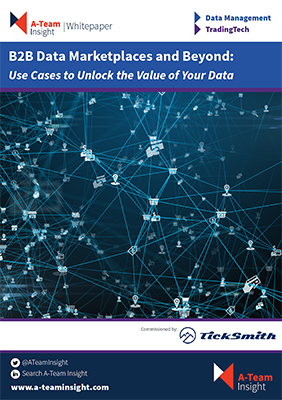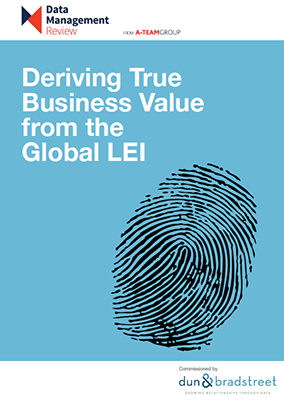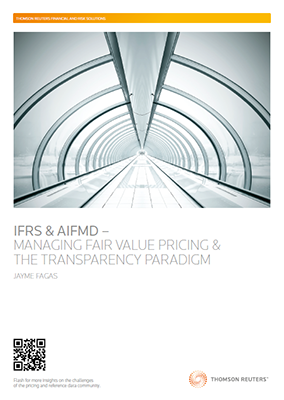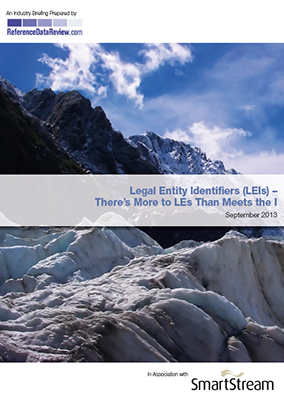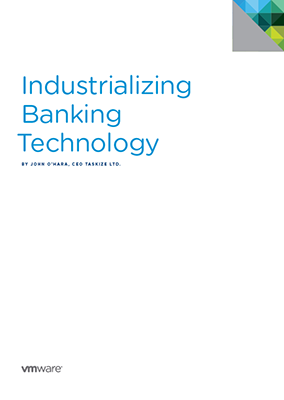Data Management Insight Standards The latest content from across the platform
B2B Data Marketplaces and Beyond
Financial institutions and corporations often generate huge quantities of data as a by product of their core activities. This data – details of historical transactions, customer interactions and metadata for referring to instruments, counterparties or entities – can provide valuable insights for industry participants, and form the basis of a meaningful data sales business. But…
Deriving True Business Value from the Global LEI
The Legal Entity Identifier (LEI) – the free-to-use entity identifier – has established itself as a viable standard for helping financial institutions identify unique business entities that are parties to financial transactions. But it’s widely accepted to have its limitations. In particular, a lack of standardization and ability to link to associated data sets is…
IFRS & AIFMD – Managing the Pricing and Transparency Paradigm
The International Financial Reporting Standards (IFRS) and the Alternative Investment Fund Managers Directive (AIFMD) present the market with a broad and complex range of obligations. In many cases these are the first set of common obligations that will impact Fund Managers, Hedge Funds, Asset Managers, Fund Administrators & Custodians all at the same time! Going…
Legal Entity Identifiers (LEIs) – There’s More to LEs Than Meets the I
Firms everywhere remain under sustained regulatory pressure to reduce systemic risk, in part through the improvement of their view of counterparty risk. At the same time, the ongoing economic climate is forcing them to reduce costs, leading them to consider alternative operating models wherever possible. The emergence of the global legal entity identifier (LEI) standard…
Industrialising Investment Banking Technology
What does an industrialised bank look like? We are embarking on a journey already undertaken by many other industries as they matured. Using the automotive industry as an example, we see: Use of technology and lean processes to drive down costs Reduction in end-product complexity Increased regulation for a safer industry Extensive technology cross-licensing and…
Bloomberg Embraces the Legal Entity Identifier
The industry initiative to develop and promote a standard global legal entity identifier (LEI) is expected to significantly reduce the opacity associated with complex financial instruments, widely acknowledged to be a major contributing factor in the 2008 credit crisis. In this white paper, Bloomberg explains the implications of the emerging LEI for financial institutions, and…
LEI Readiness – Instant Integration with Alacra Concordance
The idea of an LEI pre-dates the 2008 financial crisis by several decades. The ISO (International Organization for Standardization) had advocated an LEI (at one time called the IBEI – International Business Entity Identifier) for many years, but was unable to pinpoint an organization ready to build and maintain such a directory. For many securities…
The Waiting Game: Standards in Corporate Actions Processing
There has been some real action of late in the standards space for corporate actions. In the US, the SEC issued a requirement for corporations to report in XBRL, and the XBRL US organisation has announced a project with the DTCC and Swift to tie the standard into ISO 20022, all of which could optimistically…
Expanding Global Identifiers in Complex Assets and Other Areas
In the post-credit crisis financial services industry, risk management, compliance and transparency have emerged as focus points for review with provision of accurate and timely data recognised as a critical element of success. Fundamental to data provision is the accurate identification of both financial instruments and counterparties – without which you cannot truly measure your…
Business Entity Identifiers – The Crucial Foundation for Accurate Risk Management (Japanese Version)
As the financial world continues to grapple with the fallout of the credit crisis, one thing is clear: managing risk is now paramount to the surviving financial institutions. But you can’t manage what you don’t know. Many financial institutions have been caught in the current environment through a lack of awareness of their true exposure…


